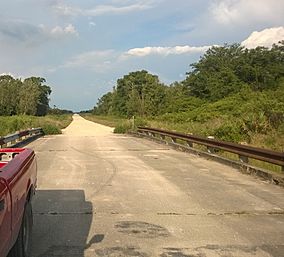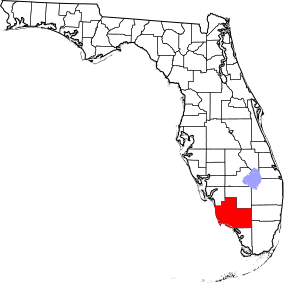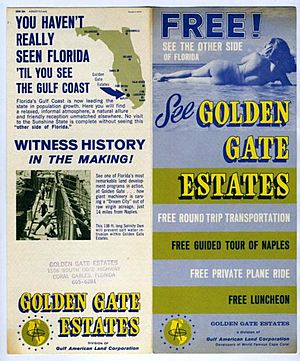Picayune Strand State Forest facts for kids
Quick facts for kids Picayune Strand State Forest |
|
|---|---|

100th Ave. in Picayune Strand State Forest
|
|

Map of Collier County in the state of Florida
|
|
| Location | Collier County, Florida |
| Nearest city | Naples, Florida |
| Area | 78,000 acres (320 km2) |
Picayune Strand State Forest is a huge natural area in Florida. It is one of 37 state forests managed by the Florida Forest Service. This amazing forest covers about 78,000 acres! It is mostly made up of cypress swamps, wet pine flatwoods, and wet prairies. You can also see old, unused roads here from past building plans.
Picayune Strand State Forest is in southwest Florida. It is located in western Collier County, about 2 miles (3.2 km) east of Naples. You can get to the forest from Everglades Boulevard, Jane's Scenic Drive, or Sabal Palm Road. The main office is at 2121 52nd Avenue SE. The forest has two main parts: the South Golden Gate Estates Tract and the Belle Meade Tract.
Contents
Discover the Forest's Past
In the 1940s and 1950s, people cut down many cypress trees in Picayune Strand. After the logging, developers bought the land. They wanted to build the biggest neighborhood in the world here! This area became known for a famous land sales issue. Buyers were often shown the land from an airplane during the dry season. Many people bought land without ever seeing it from the ground.
Few homes were built in the new neighborhood, called "Golden Gate Estates." This was because there was no electricity and the land flooded in the summer. By the 1970s, it was clear that the many canals were harming the natural areas. These canals also affected Faka Union Bay and the Ten Thousand Islands.
Soon, state and federal groups saw that the area needed to be fixed. They started a plan to bring the water flow back to normal. In 1985, the first parts of the land were bought back. This was part of the "Save Our Everglades" program. It was a very big job because they had to buy land from 17,000 different owners! In 1998, the U.S. government gave Florida $25 million to help buy the rest of the land. The Picayune Strand State Forest officially got its name in May 1995.
Why This Forest is So Important
The Picayune Strand is very important for the health of the nearby Everglades ecosystem. In the past, the wetlands here helped refill the groundwater. They also controlled how fresh water flowed into the southern bays. The canals built in the 1970s changed this. They drained the wetlands and sent too much fresh water into the bays.
Because of this, plants from drier areas and plants that don't belong there started to grow. The delicate balance of fresh and saltwater in the bays was also ruined. This caused many animals to lose their homes. Fixing Picayune Strand was a key part of the Comprehensive Everglades Restoration Plan (CERP).
Exploring Natural Features and Habitats
Picayune Strand State Forest is in the middle of an area called the Big Cypress Basin. Most of this forest is underwater during the wet season. The forest has cypress swamps, pine flatwoods, and wet prairies in the lower areas. Higher up, you can find subtropical hardwood hammocks. The northern part of the Belle Meade Tract has many younger slash pine trees. Some of the older trees are over 100 years old!
This forest is home to many kinds of wildlife. Many of these animals are threatened or endangered. Here are some of the animals you might find in the forest:
- Cougars (also called Florida panthers)
- Red-cockaded woodpeckers
- Black bears
- White-tailed deer
- Wild turkeys
- Bald eagles
- Wood storks
- Big Cypress fox squirrels
- Swallow-tailed kites
Even though you might not see a Florida panther, you can often find their tracks!
Fun Things to Do in the Forest
Picayune Strand State Forest offers many fun activities!
- Horseback Riding: There is a 22-mile (35 km) horse trail on the Belle Meade Tract. It goes from Miller Boulevard to Benfield Road. If you bring a horse, you must have proof of a current negative Coggins Test.
- Camping: There is a basic campground for horses next to the main office. It has paddocks for horses. Another shady campsite is in the middle of the trail.
- Hiking and Biking: The four-mile Sabal Palm Trail is great for hikers and cyclists. You can easily get to it from Sabal Palm Road. This trail is also part of the Great Florida Birding Trail.
- Important Note: The trails often flood during the wet season. Also, vehicles like ATVs, off-highway motorcycles, and swamp buggies are not allowed.
All visitors to the forest need to pay a $2.00 day-use fee. You can pay this fee at special "iron ranger" stations located around the forest.
 | Charles R. Drew |
 | Benjamin Banneker |
 | Jane C. Wright |
 | Roger Arliner Young |


